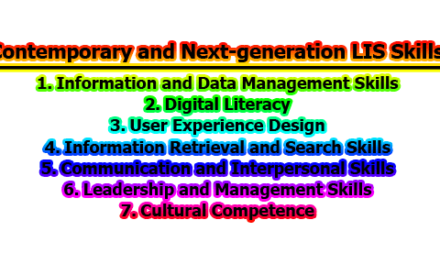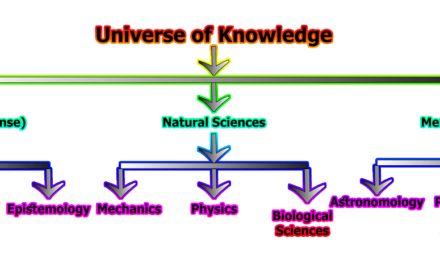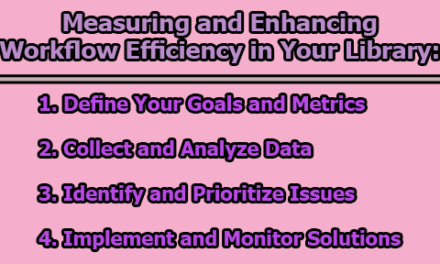How to Communicate the Value of Archival Research to Library Patrons:
Archival research is a valuable method of inquiry that can enrich the knowledge and understanding of library patrons. However, many people may not be aware of the benefits and challenges of working with archival materials or how to access and use them effectively. In this article, we will share some tips on how to communicate the value of archival research to library patrons and how to encourage them to explore the rich and diverse collections of archives.
What is Archival Research?
Archival research is the process of finding, analyzing, and interpreting primary sources preserved in archives. Archives are collections of documents, records, artifacts, and other materials that provide evidence of past events, activities, and experiences. These materials often include diaries, letters, photographs, official documents, newspapers, and more. Archives can be found in various institutions, such as libraries, museums, universities, government agencies, and private organizations.
Archival research goes beyond merely reading history books; it allows library patrons to engage directly with the raw materials of the past, uncovering stories and perspectives that may not be readily available in secondary sources. It’s like stepping back in time, immersing oneself in the context of bygone eras.
Why is Archival Research Important?
Archival research is crucial because it can help library patrons learn from the past, understand the present, and imagine the future. It reveals different perspectives, voices, and stories that may not be found in secondary sources like textbooks, articles, or websites. Furthermore, archival research can challenge assumptions, question narratives, and stimulate curiosity. It can contribute to various fields of study, such as history, sociology, anthropology, literature, art, and science.
By accessing primary sources, library patrons can engage with the historical actors and agents who shaped the past, gaining a more profound understanding of the events, decisions, and cultural contexts that have led us to our current moment. It provides an opportunity to think critically and appreciate the complexities of history.
How to Access Archival Materials?
Accessing archival materials can be a rewarding yet challenging endeavor. These materials are often unique, valuable, and come with certain rules and procedures that library patrons should be aware of. Here’s a comprehensive guide on how to access archival materials:
- Identify Your Research Topic: Begin by clearly defining your research topic or question. Knowing what you’re looking for will help streamline the search process and make it easier to locate relevant archival materials.
- Contact the Archival Institution: Start by identifying archival institutions that may hold materials related to your topic. This could include libraries, museums, universities, government agencies, and private organizations. Research and compile a list of potential institutions.
- Online Research: Many archival institutions have online catalogs and databases where you can search for materials related to your topic. These online resources often provide descriptions of the collections, making it easier to determine if they contain what you need.
- Visit the Archival Institution: If you’re unable to find the materials you need online or if the institution does not provide online access, consider visiting the institution in person. Plan your visit ahead of time and check their opening hours and access policies.
- Requesting Materials: Once you’ve identified the materials you need, contact the archival institution to request access. Most institutions have a formal request process. You may need to provide information about your research, including your research topic and purpose.
- Handling Materials: When you’re granted access to the materials, it’s crucial to handle them with care. Archival materials are often delicate and should be treated gently. This may involve wearing gloves, using book cradles, and avoiding any actions that could damage the items.
- Ethical and Legal Considerations: Library patrons should be aware of the ethical and legal issues associated with using archival materials. These can include copyright, privacy, and consent. Respect the institution’s policies and seek permission when required. Always provide proper citation and credit for the materials you use.
- Consult with Archivists: Archivists are experts in managing and preserving archival materials. They can provide valuable guidance on how to access and use these materials effectively. If you’re uncertain about handling a particular item or adhering to ethical and legal guidelines, don’t hesitate to ask the archivists for assistance.
- Make Copies if Necessary: In some cases, you may be allowed to make copies or scans of archival materials for your research. Ensure you understand the institution’s policies regarding copying materials, any associated costs, and the technical aspects of copying.
- Return Materials: After using the materials, be sure to return them to the archival institution as instructed. Maintaining the integrity of the materials is crucial to ensure their preservation for future researchers.
- Share Your Findings: If you discover valuable insights or information during your research, consider sharing your findings with the archival institution. They may appreciate your contributions and use them to enhance their own knowledge about the collections.
By following these steps and being mindful of the ethical and legal considerations, library patrons can effectively access and use archival materials for their research, unlocking a wealth of historical information and enriching their understanding of the past.
How to Use Archival Materials?
Effectively using archival materials is a crucial aspect of conducting meaningful research and making the most of these valuable historical resources. Here are some tips for library patrons on how to use archival materials:
- Evaluate Reliability, Validity, and Bias: Start by critically assessing the archival sources you’re working with. Consider the reliability of the materials – were they created by eyewitnesses or individuals with firsthand knowledge? Evaluate their validity, meaning whether they can be considered a true representation of the past. Additionally, be aware of any potential biases in the materials. Understand the perspectives and motivations of the creators that may have influenced the content.
- Understand Historical Context: To make sense of archival materials, it’s essential to understand the historical context in which they were created. Consider the social, political, and cultural factors that influenced the content. This will help you interpret the materials more accurately and recognize any hidden meanings or intentions.
- Organize and Document Your Research: Keep meticulous records of the materials you access, including details such as collection names, box and folder numbers, and publication dates. Organize your research in a systematic manner to make it easier to retrieve information later. Many researchers use spreadsheets or databases to catalog their findings.
- Cite Properly: Proper documentation and citation are essential in archival research. Follow established citation styles, such as Chicago, APA, or MLA, depending on your field of study. Ensure that you provide accurate citations for each archival source you use. Proper citation is not only a matter of academic integrity but also helps other researchers and scholars locate and verify your sources.
- Share Your Findings: Archival research is not just for personal enrichment; it’s an opportunity to contribute to the collective understanding of history and society. Consider sharing your findings and arguments with the broader community. This can be done through academic publications, presentations, or even public lectures. Sharing your research encourages discussions and adds to the body of historical knowledge.
- Be Creative and Innovative: Don’t confine your use of archival materials to purely academic pursuits. Library patrons should be encouraged to be creative and innovative in their approach. For example, consider using digital tools and platforms to create interactive exhibits or online archives that showcase your findings to a wider audience. This not only helps preserve the materials but also makes history more accessible and engaging.
- Embrace Storytelling: Storytelling can be a powerful way to bring historical narratives to life. Use your findings to craft compelling stories that capture the essence of the past. Whether through written narratives, podcasts, or multimedia presentations, storytelling can make historical events more relatable and captivating for a diverse audience.
- Collaborate and Share with Peers: Collaborate with other researchers, scholars, and peers interested in similar topics. Sharing insights and findings with others can lead to a more comprehensive understanding of the past and may spark new research directions or projects.
Effectively using archival materials involves a combination of critical thinking, contextual understanding, meticulous documentation, proper citation, and a willingness to share your findings with the world. By being creative and innovative, you can not only advance your own research but also make history more accessible and engaging for a broader audience. Archival research is a rich and rewarding pursuit, and these practices ensure that the knowledge gained from it benefits both present and future generations.
How to Promote Archival Research?
Promoting archival research within the library community is essential to raise awareness of the rich historical resources available and to encourage library patrons to explore and engage with these valuable materials. Here are some strategies to promote archival research effectively:
- Create Informative Marketing Materials: Develop eye-catching marketing materials such as flyers, posters, and brochures that provide an overview of your archival collections. Include compelling images, brief descriptions of notable items, and information on how patrons can access these materials.
- Publish Newsletters and Blogs: Regularly publish newsletters or blogs dedicated to archival research and the materials available in your library’s collections. Highlight interesting discoveries, share stories related to the materials, and provide research tips and best practices. Make sure to promote these publications through various library channels.
- Produce Podcasts and Videos: Engage with a wider audience by creating podcasts or video series focused on archival materials. These multimedia formats can provide a more interactive and immersive experience for library patrons. Interview researchers, share behind-the-scenes looks at your archival collections, and explore historical topics in an engaging manner.
- Utilize Social Media: Leverage the power of social media platforms to reach a broader audience. Regularly post content about your archival materials, including interesting facts, highlights, and stories. Encourage user engagement by posing questions, hosting polls, or running online contests related to your collections.
- Host Workshops and Training Sessions: Organize workshops and training sessions on how to conduct archival research. Provide hands-on experience with using archival materials, accessing online databases, and understanding citation practices. Offer both introductory and advanced sessions to cater to a diverse audience.
- Conduct Tours of Your Archives: Schedule guided tours of your library’s archival facilities to give patrons a firsthand look at how materials are stored and preserved. This demystifies the archival process and helps patrons understand the care that goes into maintaining these valuable resources.
- Organize Lectures and Talks: Invite experts, researchers, and archivists to deliver lectures or talks on specific topics related to your archival collections. These events can be both educational and inspiring, drawing the interest of library patrons and researchers alike.
- Host Exhibitions: Create temporary or permanent exhibitions within your library to showcase select archival materials. These exhibitions can be thematic, historical, or related to local events. They provide a tangible way for patrons to engage with the collections.
- Collaborate with Educational Institutions: Forge partnerships with local schools, colleges, and universities to promote archival research. Offer workshops or presentations to students and faculty, encouraging them to utilize your collections for research projects.
- Support Community Engagement: Actively engage with your local community by participating in events, fairs, and cultural festivals. Use these opportunities to promote your archival resources and demonstrate their relevance to everyday life.
- Create Online Resources: Develop a dedicated section on your library’s website for archival research. Provide online finding aids, research guides, and digitized materials. Make it easy for library patrons to access and explore your collections remotely.
- Seek Feedback and Adapt: Continuously seek feedback from library patrons to understand their needs and interests. Use this input to refine your promotional efforts and tailor your content to meet their expectations.
Promoting archival research involves a multi-faceted approach that encompasses various media, events, and educational opportunities. By making archival materials more accessible and engaging for library patrons, you can encourage a deeper appreciation of history and the value of these unique resources.
How to Collaborate with Archivists?
Collaborating with archivists is a valuable way to facilitate archival research and enhance the experience for library patrons. Here are steps to establish and maintain productive relationships with archivists:
- Identify Relevant Archivists: Start by identifying archivists who specialize in the field or subject matter related to your library’s archival collections. Archivists often have diverse areas of expertise, so it’s important to connect with those who align with your library’s materials and research interests.
- Contact Archivists: Reach out to archivists through email or phone to introduce yourself and your library’s goals. Explain the purpose of your collaboration and how it can benefit both your library and the archival institution. Be clear about your objectives and the specific areas in which you seek assistance.
- Visit Archival Institutions: Whenever possible, plan visits to the archival institutions where archivists work. This allows you to become familiar with the facilities, collections, and the archivists themselves. Face-to-face meetings can establish a stronger connection and provide a deeper understanding of their resources.
- Invite Archivists to Your Library: Extend invitations to archivists to visit your library and explore your archival collections. Such visits can help archivists understand your resources, and they may offer valuable insights on how to utilize them effectively.
- Join Professional Associations: Many archivists are members of professional associations and communities. Consider joining these associations or participating in relevant events, conferences, or workshops. These platforms provide opportunities for networking, sharing knowledge, and building collaborative relationships with archivists.
- Attend Archivist-Led Workshops or Training Sessions: Archivists often conduct workshops and training sessions related to archival research, preservation, and handling materials. Attend these sessions to gain insights into best practices and establish connections with archivists who can guide library patrons.
- Collaborative Projects: Explore collaborative projects that allow library staff and archivists to work together on research initiatives or events. For example, co-hosting exhibitions, lectures, or workshops can provide a platform to showcase the library’s archival collections and archivists’ expertise.
- Consult for Research Guidance: Archivists can offer valuable guidance on research methodologies, source evaluation, and resource discovery. Consult with them to ensure library patrons receive the best possible support for their archival research.
- Develop Clear Agreements: When initiating collaborative projects or sharing resources, create clear agreements outlining roles, responsibilities, and expectations. This helps to avoid misunderstandings and ensures a smooth collaboration.
- Recognize and Acknowledge Archivists: Give credit and recognition to the archivists you collaborate with. Highlight their expertise and contributions in any publications, events, or projects in which they are involved. Acknowledging their support fosters a positive working relationship.
- Maintain Open Communication: Foster an ongoing, open line of communication with archivists. Keep them informed about your library’s goals, acquisitions, and any developments related to the archival collections. Encourage feedback and address any issues promptly.
- Foster Long-Term Relationships: Collaborating with archivists is not a one-time effort. Aim to build and maintain long-term relationships. The more you engage with archivists, the more beneficial and seamless your collaborations will become over time.
Collaborating with archivists offers library patrons a wealth of knowledge and expertise, enriching their archival research experience. By establishing and nurturing relationships with archivists, libraries can bridge the gap between their patrons and the vast world of archival materials, creating a dynamic and supportive research environment.
In conclusion, archival research is a valuable method of inquiry that enriches the knowledge and understanding of library patrons. By effectively communicating its value, providing access to resources, and offering support and guidance, libraries can empower their patrons to explore the rich tapestry of history and discover the wealth of stories and insights preserved within archival collections. Archival research is a journey back in time, and with the right tools and encouragement, library patrons can unlock the past and gain a deeper appreciation of the present and future.

Library Lecturer at Nurul Amin Degree College










